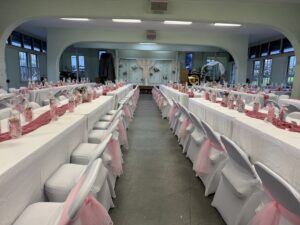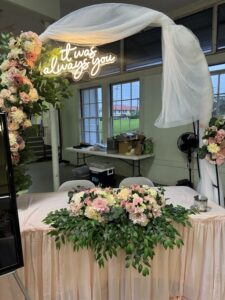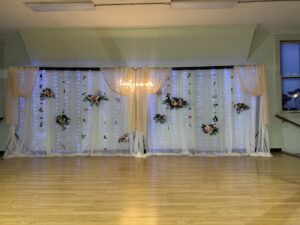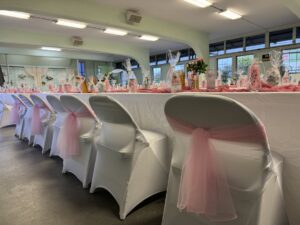Weddings
Will you marry me? and let us have something we gaze upon together.
Among the myriad of life’s events and journeys, the one initiated by the phrase above could be one of the happiest: a wedding. Two individuals, born into different lives, begin to share a single life together as spouses and vow to live together under the guidance of Amida Buddha.
Rev. Tomioka officiates the marriage and civil union. If you are considering the wedding, here is some useful information and the official (legal) procedure.
- Hawaii Registration System
- How to get a marriage license in Hawaii
- Hawaii Department of Healthy: Registration Site
Please fill out the document as you begin planning and reach out to Rev. Tomioka to schedule a meeting where you can set a date and time to discuss the details. Email at mpunahongwanji@twc.com or call at 8089669981
Today, weddings can be styled in various ways to reflect the desires of the couple, their families, and the traditions they adhere to. The venue may be a beach, forest, church, home, or any place selected by them, officiated by a judge, non-denominational officiant, or clergy. Ultimately, the couple’s preferences and circumstances dictate the final decision. The significance of a Hongwanji Buddhist wedding lies in its auspicious nature, where the couple vows their commitment to the Dharma in the presence of Amida Buddha.
The reasons for approaching us for a wedding may vary, from being a temple member, having a connection with the temple, seeking the nearest religious institution, or simply the desire to marry. Regardless of the reason, we are delighted and honored to witness and conduct the ceremony for you. The Hongwanji wedding ceremony is of Buddhist tradition, particularly conducted in the presence of Amida Buddha, the Buddha of Infinite Light and Life. It is Amida Buddha’s Great Compassion and Wisdom that support the couple on their new journey. The couple’s vows are made not before the attendees or each other, but before Amida Buddha, which is the central aspect of the ceremony.
During the ceremony, the sight of the newlyweds holding hands, sharing the moment, and looking into each other’s eyes with love and trust is both beautiful and moving. Having had the privilege to officiate many ceremonies, I find each one uniquely stirring and deeply beautiful. I often say, as you embark on this new journey, take a moment not just to look at each other, but to find a common focus. This symbolizes the joy and love that overflow in the beginning, making everything seem sweet and perfect, with only the best traits visible, leading to a ‘happily ever after.’ Yet, as time passes, the couple will face challenges that may test their love and require them to learn to love anew. Love evolves because we are human; we may start to notice previously unseen or unappreciated aspects in each other. If the couple only looks at one another, they may focus on negatives, leading to blame and defense rather than care, understanding, and respect. This is why I emphasize the importance of ‘having something you gaze upon together.’
In this context, it is Amida Buddha, the embodiment of Compassion and Wisdom, whose love and care perpetually reach out to guide us. Witnessing such loving compassion prompts self-reflection: perhaps I should not have spoken in that manner, nor acted with such an attitude, and it encourages one to think, speak, and act with compassion, recognizing one’s ego. Illuminated by eye-opening wisdom, we are enabled to view situations from our spouse’s perspective, not solely our own. Having personal leanings and preferences is natural; the key is understanding. Wisdom allows us to pause, reflect, and question our righteousness. (This often crosses my mind during heated discussions with my spouse. Yet, the following morning, with a calmer, more reflective mindset, I usually realize my faults and apologize, admitting my wrongdoing. Yes, she is right!) Accepting our imperfections (not easy, though) is perfectly okay; relationships and love evolve, and in navigating this complex modern life, we seek guidance. This guidance is the vow of Amida Buddha to embrace and lead the couple.
As the couple exchanges their vows, Amida Buddha has long vowed to be present with compassion and wisdom, reaffirming this commitment to the couple. This is the reason for choosing to wed at the Hongwanji temple, in the presence of Amida Buddha, encircled by family and friends from past, present, and future. As the newlyweds commence their shared journey, they navigate life’s joys and sorrows, highs and lows, with guidance akin to a lighthouse amidst the sea, a home with open arms, an ear for whispers, and a shoulder on which to lean. Guided by Amida Buddha’s Compassion and Wisdom, they will lead their lives and ultimately pass on when the breath ceases. However, within Amida’s embrace, there is no goodbye in Amida’s embrace, they are together, forever.
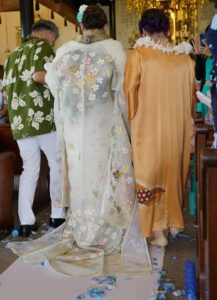
Example of a potential hall arrangement.
